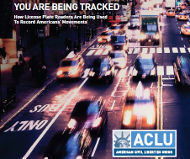ACLU Report Exposes Extent Of License Plate SurveillanceReport documents police use of automated license plate recognition technology.TheNewspaper Jul. 18, 2013 |
Popular 
Eloy Adrian Camarillo, 17, Arrested in Shooting Death of Infowars Reporter Jamie White

NYT: Trump Ended War With Houthis After They Shot Down U.S. Drones, Nearly Hit Fighter Jets

Ben Shapiro, Mark Levin and Laura Loomer Warn of Foreign Influence... From Qatar

Trump Advisor to Washington Post: 'In MAGA, We Are Not Bibi Fans'

Trump Cut Off Contact With Netanyahu Over 'Manipulation' Concerns, Israeli Reporter Claims
  The American Civil Liberties Union has been gathering information on police use of motorist surveillance technologies for more than a year. The group's report, issued Wednesday, adds to the national debate on domestic spying in the wake of the revelation that the National Security Agency has been collecting and storing emails and telephone GPS location data on everyone. The American Civil Liberties Union has been gathering information on police use of motorist surveillance technologies for more than a year. The group's report, issued Wednesday, adds to the national debate on domestic spying in the wake of the revelation that the National Security Agency has been collecting and storing emails and telephone GPS location data on everyone. "License plate readers are just one example of a disturbing phenomenon: the government is increasingly using new technology to collect information about all of us, all the time, and to store it forever -- providing a complete record of our lives for it to access at will," ACLU staff attorney Catherine Crump explained in a statement on the report's release. The report collated 26,000 pages of documents from 38 states describing the way individual police departments use automated license plate recognition cameras (ALPR, also known as ANPR in Europe). The cameras record the movement of all passing vehicles and store the information in a centralized database. Police in real time can find vehicles on a "hot list" to issue tickets for expired registration or unpaid parking tickets. Cars have been towed from home driveways, WalMart parking lots and even outside church during services for alleged non-payments of as little as $50. The ACLU documents show the devices also give police the ability to look back in the past and perform a "convoy" search to find vehicles that frequently travel together. A "cross search" allows officers to create a list of vehicles that drove past a set of particular locations and times. This would, for example, isolate individuals that may be regular attendees at a political rallies or meetings. The ACLU report warned that this powerful tracking ability opens the door to abuse. "If not properly secured, license plate reader databases open the door to abusive tracking, enabling anyone with access to pry into the lives of his boss, his ex-wife, or his romantic, political, or workplace rivals," the report stated. The data show that in most jurisdictions, 99 percent of the vehicles recorded have done nothing wrong. Maryland tracked 85 million license plates in 2012, and of the 0.2 percent flagged as a violation, 97 percent of had expired registrations. Only 0.005 percent of the total reads pointed to a serious crime. Even if a "hit" is registered, it does not mean that the vehicle is actually being driven by a criminal, as the database information is frequently wrong, something that has led to fatal mistakes in the UK, where license plate cameras are more widely used. "In short, Maryland's license plate readers collect massive amounts of data, almost none of which are tied to any known or even suspected wrongdoing," the report concluded. "Even the vast majority of hits are for minor regulatory violations." The report found that US law enforcement agencies rarely place any limits on the use of ALPR. The Scarsdale, New York police department says the use "is only limited by the officer's imagination." The ACLU recommends that states adopt strict data retention policies and limit the use of ALPR to investigating specific crimes. A copy of the report is available in a 2.2mb PDF file at the source link below. Source: You Are Being Tracked (American Civil Liberties Union, 7/17/2013) |



